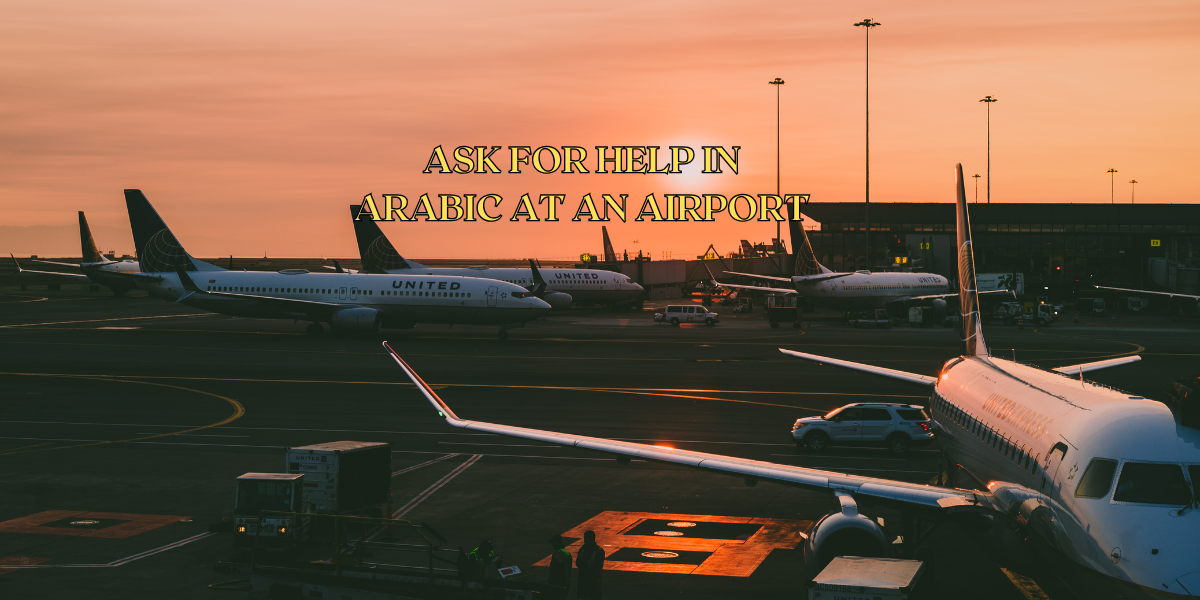How to Ask for Help in Arabic at an Airport
Airports can feel stressful when you travel to a new country. You deal with tickets, luggage, security, and directions all at once. If you are an Arabic learner, being in an Arabic-speaking airport can be both exciting and difficult. You may see signs in Arabic, hear announcements you do not fully understand, and meet staff who do not speak your language. In these moments, knowing how to ask for help is not just useful — it is essential.
Many travelers freeze when they do not know what to say. They may hesitate to ask for assistance or worry about making mistakes. This often leads to confusion, missed flights, or lost baggage. You can avoid these problems if you prepare in advance. Learning the right Arabic phrases and expressions will make you confident and calm. You will be able to ask for directions, check flight information, and solve problems faster.
Asking for help in Arabic is not just about memorizing sentences. It is also about understanding cultural habits and polite ways of speaking. People in Arabic-speaking countries value respect and friendliness. The way you speak and your tone of voice matter. A polite request will get a better response than a rushed or demanding question. Knowing the right words shows you respect the local language and culture, and this creates a positive experience for you and the person helping you.
This article will guide you through the most common situations you might face in an airport. You will learn how to ask where your gate is, how to find a restroom, how to deal with lost luggage, and how to communicate with airline staff. You will see clear examples and practical phrases that you can use right away. Even if your Arabic is basic, you can still make yourself understood if you know a few key words and expressions.
You will also learn tips to improve your listening skills so you can catch announcements and follow instructions. Many airports use a mix of Arabic and English, but sometimes announcements are made only in Arabic. Being able to recognize numbers, times, and common airport terms will help you avoid missing important information.
If you are learning Arabic, think of the airport as a place to practice. Every interaction is a chance to improve. Asking for help is not a weakness — it is a skill. You will discover that most airport staff are happy to help when you try to communicate in their language. This builds your confidence and makes your trip smoother.
This guide is for anyone who wants to travel more easily in Arabic-speaking countries. Whether you are a beginner or an advanced learner, you will find something here that makes your journey less stressful and more successful.
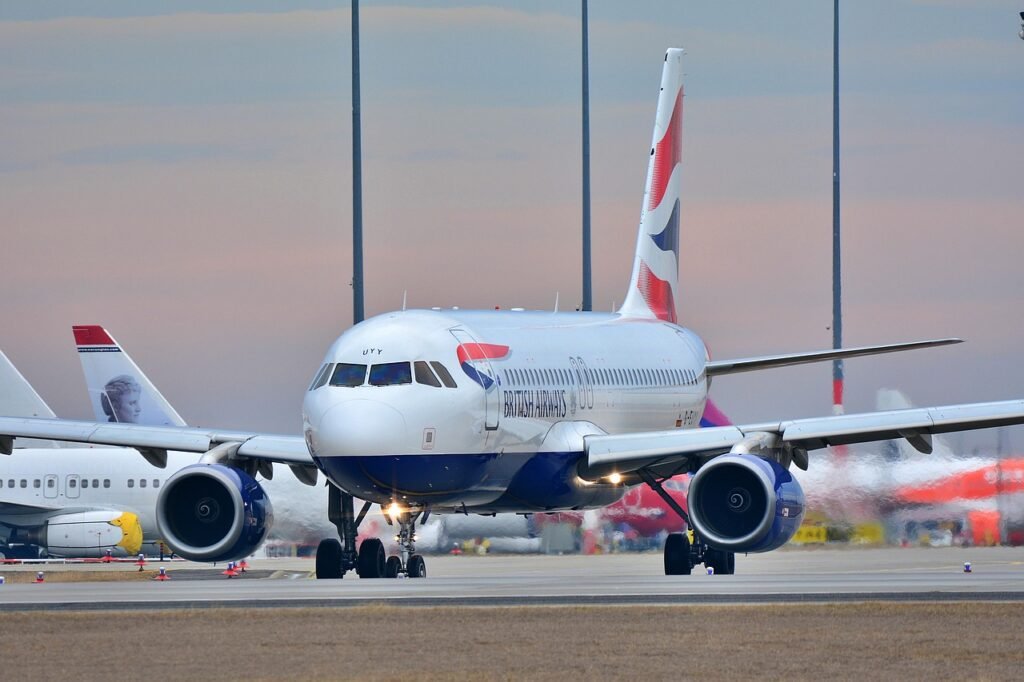
Asking for Help at the Check-In Counter
The first step in any airport is usually the check-in counter. This is where you drop off your luggage and get your boarding pass. If you are in an Arabic-speaking country, knowing a few phrases will make this process smooth.
Start with a simple greeting. A smile and “السلام عليكم” (as-salāmu ʿalaykum) — peace be upon you — is the most common polite greeting. The staff will appreciate it. You can then follow with “أريد تسجيل الوصول” (urīdu tasjīl al-wuṣūl), which means “I want to check in.”
Sometimes you might not know which counter is yours. You can ask:
- “أين كاونتر الخطوط الجوية؟” (ayna kāwntir al-khuṭūṭ al-jawwiyya?) – Where is the airline counter?
- “أين أستطيع تسجيل الحقائب؟” (ayna astaṭīʿ tasjīl al-ḥaqāʾib?) – Where can I check my bags?
If there is a problem with your ticket, stay calm. Use clear words to explain. You can say:
- “لدي مشكلة في التذكرة” (ladayya mushkila fī al-tadhkira) – I have a problem with my ticket.
- “هل يمكن أن تساعدني؟” (hal yumkin an tusāʿidunī?) – Can you help me?
Finding Your Gate
After check-in, the next challenge is finding your gate. Airports can be big, and signs are not always clear. To ask for directions, use:
- “أين بوابة الرحلة؟” (ayna bawābat ar-riḥla?) – Where is the flight gate?
- “كيف أصل إلى البوابة رقم 12؟” (kayfa aṣil ilā al-bawwāba raqam ithnā ʿashar?) – How do I get to gate 12?
If you are late or worried about time, you can ask:
- “كم بقي على صعود الطائرة؟” (kam baqiya ʿalā ṣuʿūd aṭ-ṭāʾira?) – How much time is left before boarding?
Learning to recognize numbers in Arabic is very useful here. Flight numbers, gate numbers, and times are often announced only in Arabic. Practice listening to numbers from 1 to 50 before your trip so you can catch them quickly.
Going Through Security
Security can be stressful. Staff may give instructions fast, and you need to respond quickly. Learn key words such as:
- “حقيبة” (ḥaqība) – bag
- “جهاز الكمبيوتر” (jihāz al-kumbyūtar) – computer
- “حذاء” (ḥidhāʾ) – shoes
When in doubt, ask politely:
- “هل يجب أن أخلع الحذاء؟” (hal yajibu an akhlaʿ al-ḥidhāʾ?) – Should I take off my shoes?
- “أين أضع الحقيبة؟” (ayna aḍaʿ al-ḥaqība?) – Where should I put the bag?
Staff appreciate when travelers ask questions instead of guessing. It keeps the line moving and avoids confusion.
Handling Flight Changes
Sometimes flights get delayed or cancelled. You may hear an announcement in Arabic and need to confirm what it means. Walk to the nearest desk and say:
- “هل تأخرت الرحلة؟” (hal taʾakhkharat ar-riḥla?) – Is the flight delayed?
- “متى الإقلاع الجديد؟” (matā al-iqlāʿ al-jadīd?) – When is the new departure?
If you need to rebook, say:
- “أحتاج إلى تغيير الحجز” (aḥtāju ilā taghyīr al-ḥajz) – I need to change the booking.
By preparing these phrases, you will save time and reduce stress. You will feel more confident and able to handle problems on your own.
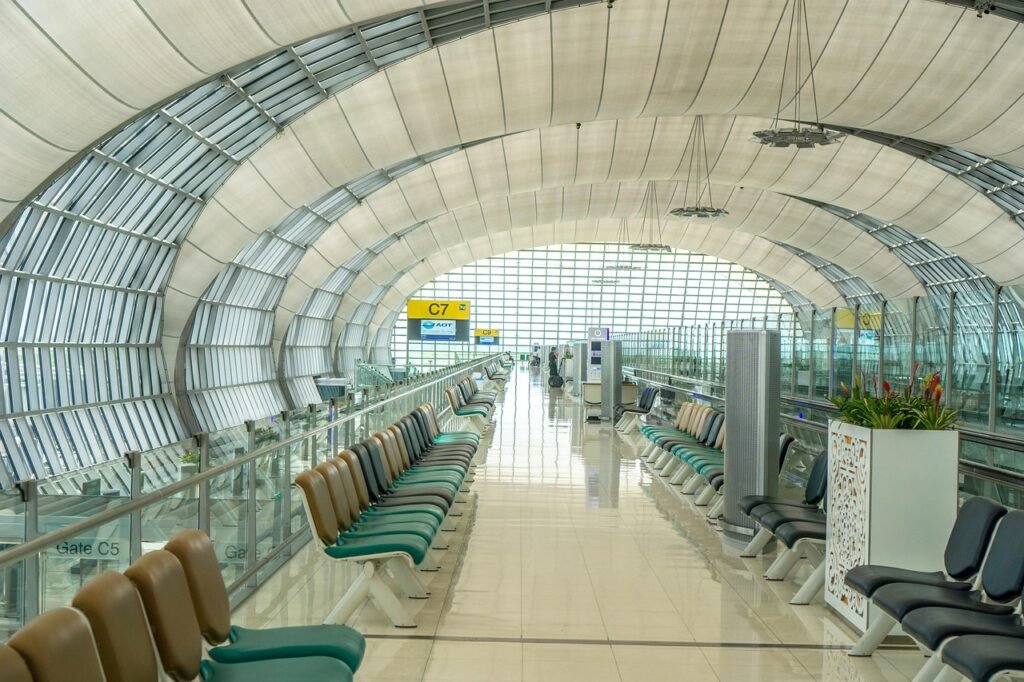
Dealing with Lost or Delayed Luggage
Lost luggage is one of the most stressful situations for any traveler. If your bags do not arrive, go straight to the baggage service office. Start with a polite greeting and explain the problem.
You can say:
- “لم أجد حقيبتي” (lam ajid ḥaqībatī) – I did not find my bag.
- “حقيبتي لم تصل” (ḥaqībatī lam taṣil) – My bag did not arrive.
- “ماذا يجب أن أفعل؟” (mādhā yajibu an afʿal?) – What should I do?
They may ask for a description of your luggage. Learn simple words to describe it:
- “كبيرة” (kabīra) – big
- “صغيرة” (ṣaghīra) – small
- “سوداء” (sawdāʾ) – black
- “حمراء” (ḥamrāʾ) – red
You can also say:
- “كانت على رحلة رقم ١٢٣” (kānat ʿalā riḥla raqam 123) – It was on flight number 123.
Be ready to show your baggage tag. This helps staff find your bag quickly.
Going Through Customs
After you collect your luggage, you go through customs. Officers may ask you questions about what you are carrying. They might say “هل معك شيء لتصرح عنه؟” (hal maʿaka shayʾ lituṣarriḥ ʿanhu?) – Do you have anything to declare?
If you have nothing to declare, answer:
- “لا” (lā) – No
- “ليس معي شيء” (laysa maʿī shayʾ) – I have nothing with me
If you are carrying food, electronics, or other items, be honest and say:
- “معي بعض الأغراض” (maʿī baʿḍ al-aghraḍ) – I have some items
Customs officers are used to travelers who do not speak perfect Arabic. A calm tone and clear answers are enough.
Asking for Restrooms, Food, and Services
Airports can be confusing. Sometimes signs are not in English. Knowing how to ask for basic services saves time.
To ask for a restroom, say:
- “أين الحمام؟” (ayna al-ḥammām?) – Where is the restroom?
For food or water, say:
- “أين المطعم؟” (ayna al-maṭʿam?) – Where is the restaurant?
- “أين أستطيع شراء ماء؟” (ayna astaṭīʿ shirāʾ māʾ?) – Where can I buy water?
If you need Wi-Fi, say:
- “هل يوجد واي فاي؟” (hal yūjad wāy fāy?) – Is there Wi-Fi?
- “ما هو الرمز السري؟” (mā huwa ar-ramz as-sirrī?) – What is the password?
For transportation, you might need a taxi or bus:
- “أين موقف التاكسي؟” (ayna mawqif at-tāksī?) – Where is the taxi stand?
- “أين محطة الحافلات؟” (ayna maḥaṭṭat al-ḥāfilāt?) – Where is the bus station?
Knowing these phrases gives you independence. You do not have to rely on translation apps or wait for someone who speaks your language.
Asking for Medical Help
If you feel sick or have an emergency, go to the information desk and say:
- “أحتاج إلى طبيب” (aḥtāju ilā ṭabīb) – I need a doctor
- “أحتاج مساعدة طبية” (aḥtāju musāʿada ṭibbiyya) – I need medical assistance
Airports have clinics or staff trained for emergencies. Asking quickly and clearly gets you help faster.
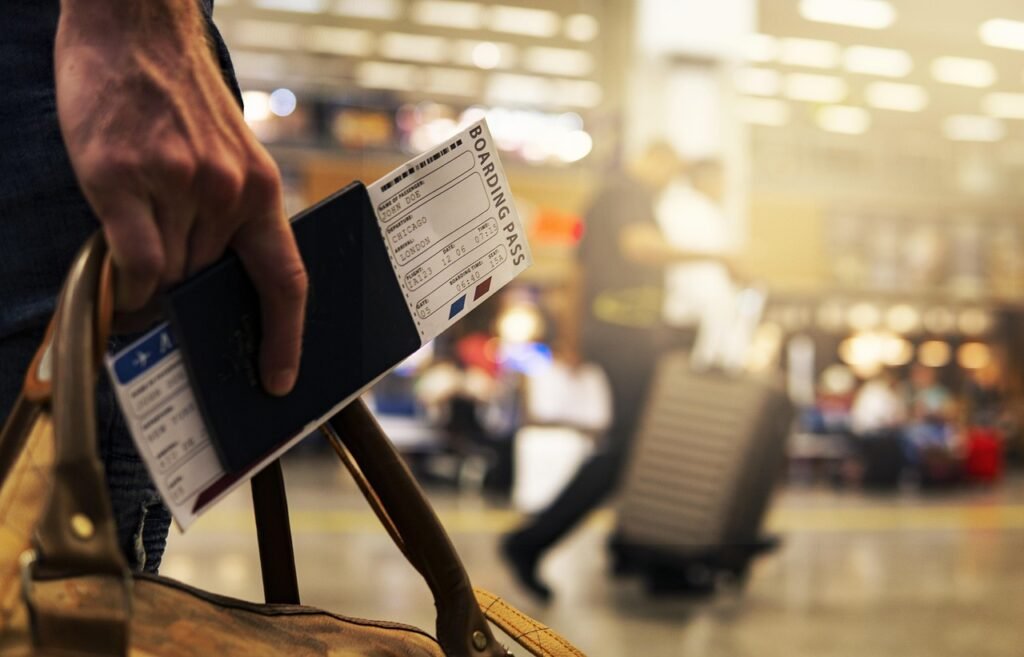
Cultural Tips and Polite Behavior
Learning the right words is important, but how you use them matters just as much. Arabic-speaking countries value politeness and respect. Small details in your tone and body language can change how people respond to you.
Start every interaction with a greeting. “السلام عليكم” (as-salāmu ʿalaykum) is the safest and most common choice. People expect some form of greeting before you ask for help. It shows good manners and sets a friendly tone.
After you get help, always say thank you. “شكراً” (shukran) is short and polite. If someone goes out of their way to assist you, you can say “شكراً جزيلاً” (shukran jazīlan) — thank you very much. Gratitude is highly valued, and staff will remember your kindness.
Use a calm voice even if you are stressed. Raising your voice or sounding impatient can be seen as rude. If you do not understand something, you can say:
- “من فضلك كرر” (min faḍlik karrir) – Please repeat
- “أبطئ من فضلك” (abṭiʾ min faḍlik) – Slower, please
These phrases are polite and will encourage the person to speak more clearly.
Respecting Personal Space
In some airports, especially in the Middle East, people may stand closer than you are used to. Do not take this as rude behavior. It is common and normal. On the other hand, when speaking to staff, keep a respectful distance and avoid pointing at them. If you need to point, gesture with your whole hand, not just one finger. This is seen as more respectful.
Common Mistakes Travelers Make
Many travelers skip greetings and go straight to their question. This can feel abrupt. A quick “السلام عليكم” takes one second and creates a positive first impression.
Another mistake is speaking too fast or using slang. If you know only a little Arabic, keep your sentences short and simple. Do not try to translate word-for-word from English. For example, instead of saying “Could you please be so kind as to direct me to the boarding gate?” just say “أين بوابة الرحلة؟” (ayna bawābat ar-riḥla?) — Where is the flight gate?
Travelers also forget to listen carefully. They ask a question but stop paying attention to the answer. Train yourself to catch key words such as gate numbers, times, and directions. If you miss them, ask again politely.
Using Technology Wisely
Translation apps can help, but do not rely on them completely. Internet access may be slow or unavailable, and pronunciation from apps can sound robotic. Learn at least the most common words before your trip. Write them down or keep a small phrase card in your pocket.
If you do use a phone, explain politely:
- “لحظة، أستخدم الترجمة” (laḥẓa, astakhdim at-tarjama) – One moment, I am using translation
This shows respect and patience, so the other person waits while you prepare your question.
Smiling and Patience
A simple smile goes a long way. It shows you are friendly and approachable. Airport staff deal with many stressed travelers every day. When you stay calm and polite, you stand out and get better service.
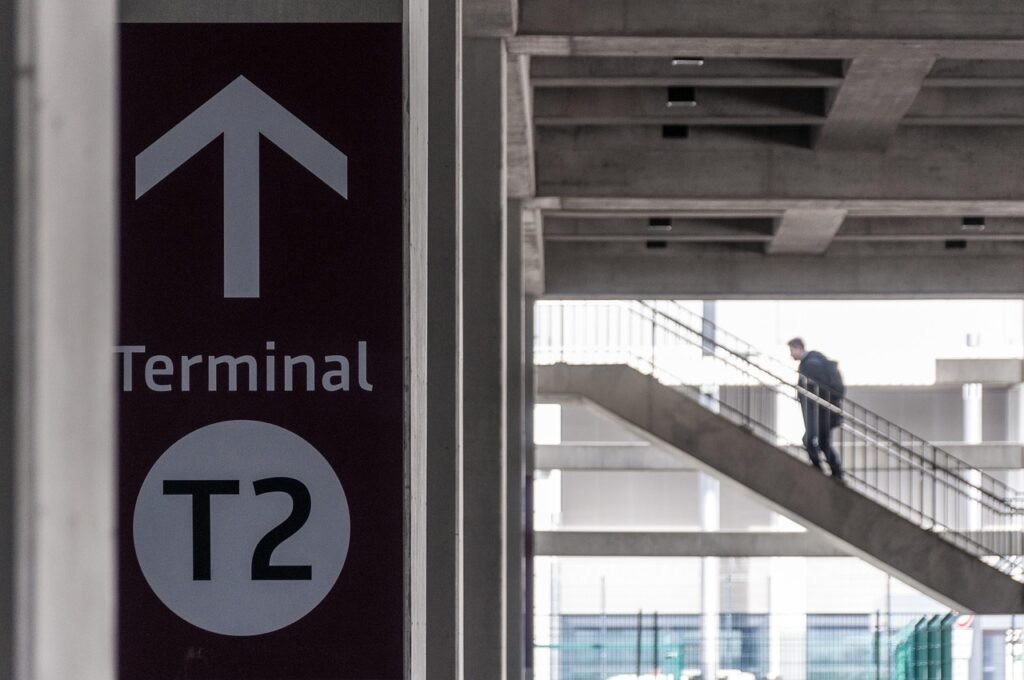
Final Advice
Asking for help in an airport can be stressful if you do not speak the local language. Arabic-speaking airports are no different. You face signs, announcements, and staff who may not speak English. Preparing in advance changes everything. Knowing a few key phrases, understanding polite behavior, and staying calm makes your experience smoother and less stressful.
Start with greetings, ask questions clearly, and show gratitude. Learn basic phrases for check-in, security, finding gates, and dealing with luggage. Practice numbers and common words so you can follow announcements. If you face delays or emergencies, simple and polite phrases will get you help quickly. A smile and calm tone go further than perfect grammar.
Pay attention to cultural habits. Respect personal space, use polite gestures, and avoid slang or long complicated sentences. Small mistakes are understandable, but politeness is noticed and remembered. Listening carefully and repeating questions when needed shows patience and respect.
Technology helps, but do not depend on it entirely. Carry a small phrase list, practice your pronunciation, and try to communicate directly whenever possible. Every interaction is a chance to improve your Arabic and gain confidence.
At Ramdani Arabic Academy, we focus on practical learning. Our lessons, courses, and articles are designed for real-life situations. We teach you not just words, but how to use them naturally and confidently. Learning how to ask for help in an airport is one example. We provide exercises, audio examples, and tips to prepare you for travel anywhere in the Arabic-speaking world.
Travel is an opportunity to practice what you learn. Every interaction, whether at a counter, security, or a taxi stand, reinforces your skills. Mistakes are part of learning. The goal is not perfection but communication. Being able to ask for help calmly, politely, and clearly will make your trip smoother and give you confidence to explore more.
The author, Ramdani Mohamed, created this guide with one purpose: to help Arabic learners navigate real-life situations. Ramdani Arabic Academy was founded to provide accessible, practical resources for students worldwide. We combine language instruction with cultural understanding, so learners are ready for real experiences, not just classroom exercises.
Following these tips will prepare you for travel, reduce stress, and improve your Arabic. The airport is more than a checkpoint — it is a place to practice, learn, and grow. By learning the phrases, observing cultural norms, and staying calm, you turn every challenge into a learning opportunity.
Prepare, practice, and be polite. Your Arabic will improve, your confidence will grow, and your travel experience will be smoother.

